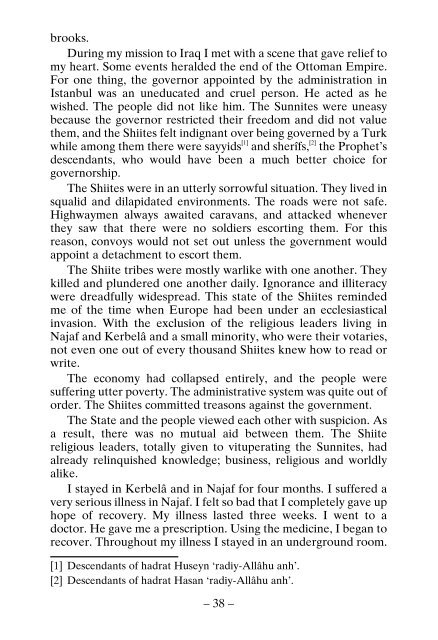Confessions Of A British Spy
Muhammad of Najd was the sort I had been looking for. For his scorn for the time’s scholars, his slighting even the (earliest) four Khalîfas, his having an independent view in understanding the Qur’ân and the Sunna were his most vulnerable points to hunt and obtain him. So different this conceited youngster was from that Ahmed Efendi who had taught me in Istanbul! That scholar, like his predecessors, was reminiscent of a mountain. No power would be able to move him. Whenever he mentioned the name of Abû Hanîfa, he would stand up, go and make an ablution. Whenever he meant to hold the book of Hadîth named he would, again, make an ablution. The Sunnîs trust this book very much. Muhammed of Najd, on the other hand, disdained Abû Hanîfa very much. He would say, “I know better than Abû Hanîfa did. In addition, according to him, half of the book of wrong.
Muhammad of Najd was the sort I had been looking for. For
his scorn for the time’s scholars, his slighting even the (earliest)
four Khalîfas, his having an independent view in understanding
the Qur’ân and the Sunna were his most vulnerable points to hunt
and obtain him. So different this conceited youngster was from
that Ahmed Efendi who had taught me in Istanbul! That scholar,
like his predecessors, was reminiscent of a mountain. No power
would be able to move him. Whenever he mentioned the name of
Abû Hanîfa, he would stand up, go and make an ablution.
Whenever he meant to hold the book of Hadîth named he would, again, make an ablution. The Sunnîs trust this book
very much.
Muhammed of Najd, on the other hand, disdained Abû Hanîfa
very much. He would say, “I know better than Abû Hanîfa did.
In addition, according to him, half of the book of wrong.
Create successful ePaper yourself
Turn your PDF publications into a flip-book with our unique Google optimized e-Paper software.
ooks.<br />
During my mission to Iraq I met with a scene that gave relief to<br />
my heart. Some events heralded the end of the Ottoman Empire.<br />
For one thing, the governor appointed by the administration in<br />
Istanbul was an uneducated and cruel person. He acted as he<br />
wished. The people did not like him. The Sunnites were uneasy<br />
because the governor restricted their freedom and did not value<br />
them, and the Shiites felt indignant over being governed by a Turk<br />
while among them there were sayyids [1] and sherîfs, [2] the Prophet’s<br />
descendants, who would have been a much better choice for<br />
governorship.<br />
The Shiites were in an utterly sorrowful situation. They lived in<br />
squalid and dilapidated environments. The roads were not safe.<br />
Highwaymen always awaited caravans, and attacked whenever<br />
they saw that there were no soldiers escorting them. For this<br />
reason, convoys would not set out unless the government would<br />
appoint a detachment to escort them.<br />
The Shiite tribes were mostly warlike with one another. They<br />
killed and plundered one another daily. Ignorance and illiteracy<br />
were dreadfully widespread. This state of the Shiites reminded<br />
me of the time when Europe had been under an ecclesiastical<br />
invasion. With the exclusion of the religious leaders living in<br />
Najaf and Kerbelâ and a small minority, who were their votaries,<br />
not even one out of every thousand Shiites knew how to read or<br />
write.<br />
The economy had collapsed entirely, and the people were<br />
suffering utter poverty. The administrative system was quite out of<br />
order. The Shiites committed treasons against the government.<br />
The State and the people viewed each other with suspicion. As<br />
a result, there was no mutual aid between them. The Shiite<br />
religious leaders, totally given to vituperating the Sunnites, had<br />
already relinquished knowledge; business, religious and worldly<br />
alike.<br />
I stayed in Kerbelâ and in Najaf for four months. I suffered a<br />
very serious illness in Najaf. I felt so bad that I completely gave up<br />
hope of recovery. My illness lasted three weeks. I went to a<br />
doctor. He gave me a prescription. Using the medicine, I began to<br />
recover. Throughout my illness I stayed in an underground room.<br />
[1] Descendants of hadrat Huseyn ‘radiy-Allâhu anh’.<br />
[2] Descendants of hadrat Hasan ‘radiy-Allâhu anh’.<br />
– 38 –


